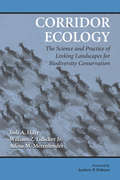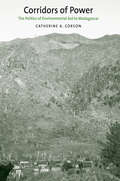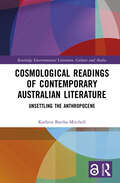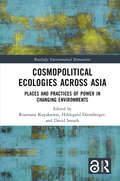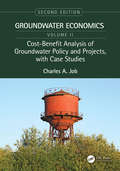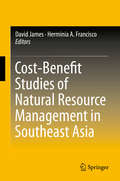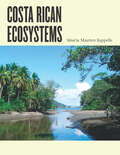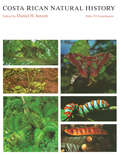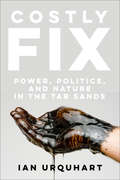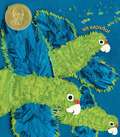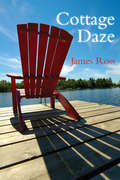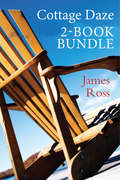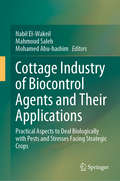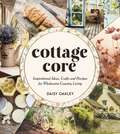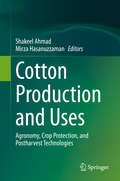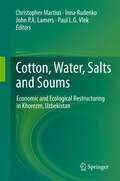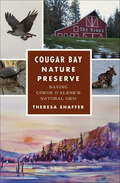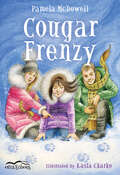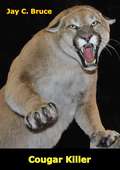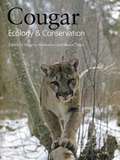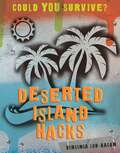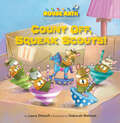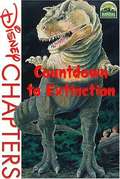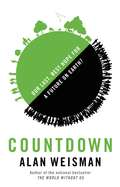- Table View
- List View
Corridor Ecology: The Science and Practice of Linking Landscapes for Biodiversity Conservation
by Adina Merenlender Jodi A. Hilty Andrew P. Dobson William Z. Lidicker Jr.Corridor Ecology presents guidelines that combine conservation science and practical experience for maintaining, enhancing, and creating connectivity between natural areas with an overarching goal of conserving biodiversity. It offers an objective, carefully interpreted review of the issues and is a one-of-a-kind resource for scientists, landscape architects, planners, land managers, decision-makers, and all those working to protect and restore landscapes and species diversity.
Corridors of Power: The Politics of Environmental Aid to Madagascar
by Catherine A. CorsonA highly regarded academic and former policy analyst and consultant charts the forty-year history of neoliberalism, environmental governance, and resource rights in Madagascar Since the 1970s, the U. S. Agency for International Development has spent millions of dollars to preserve Madagascar's rich biological diversity. Yet its habitats are still in decline. Studying forty years of policy making in multiple sites, Catherine Corson reveals how blaming impoverished Malagasy farmers for Madagascar's environmental decline has avoided challenging other drivers of deforestation, such as the logging and mining industries. In this important ethnographic study, Corson reveals how Madagascar's environmental program reflects the transformation of global environmental governance under neoliberalism.
Cosmological Readings of Contemporary Australian Literature: Unsettling the Anthropocene (Routledge Environmental Literature, Culture and Media)
by Kathrin Bartha-MitchellThis book presents an innovative and imaginative reading of contemporary Australian literature in the context of unprecedented ecological crisis. The Australian continent has seen significant, rapid changes to its cultures and land-use from the impact of British colonial rule, yet there is a rich history of Indigenous land-ethics and cosmological thought. By using the age-old idea of ‘cosmos’—the order of the world—to foreground ideas of a good order and chaos, reciprocity and more-than-human agency, this book interrogates the Anthropocene in Australia, focusing on notions of colonisation, farming, mining, bioethics, technology, environmental justice and sovereignty. It offers ‘cosmological readings’ of a diverse range of authors—Indigenous and non-Indigenous—as a challenge to the Anthropocene’s decline-narrative. As a result, it reactivates ‘cosmos’ as an ethical vision and a transculturally important counter-concept to the Anthropocene. Kathrin Bartha-Mitchell argues that the arts can help us envision radical cosmologies of being in and with the planet, and to address the very real social and environmental problems of our era. This book will be of particular interest to scholars and students of Ecocriticism, Environmental Humanities, and postcolonial, transcultural and Indigenous studies, with a primary focus on Australian, New Zealand, Oceanic and Pacific area studies.
Cosmopolitical Ecologies Across Asia: Places and Practices of Power in Changing Environments (ISSN)
by David Sneath Hildegard Diemberger Riamsara KuyakanonCosmopolitical Ecologies Across Asia offers a unique insight into the non-human and spiritual dimensions of environmental management in a changing world.This volume presents a comparative, place-based exploration of landscapes across Asia and the entities, practices and knowledges that inhabit them. Rather than treating sacred mountains, terrains and water sources as self-contained, esoteric religious phenomena, the authors consider them within critical 'cosmopolitical ecologies' framings in which non-human entities are engaged as actors in the socio-political arena. The chapters include case studies of healing springs recognized by governments, and sacred mountains that are addressed by heads of states and Communist Party cadres, or that speak to the faithful through spirit mediums in a politics of re-enchantment. Contributors explore the diverse ways in which non-human entities such as forest spirits, reindeer, mountains and Buddhist Masters of the Land are engaged by humans to navigate environmental change and address a range of ecological threats from large-scale mining to climate change. Cosmopolitical ecologies approaches encompass the healing power of topography as well as transformative intimacies with other-than-human beings such as sparrows within an Islamic eco-theological poetic setting. In this light the book observes dynamic and creative processes of cosmological innovation including the repurposing of ritual to address challenges such as the Covid-19 epidemic.This book will be of great interest to students and scholars of environment and society across disciplinary perspectives in general, and to anthropologists, human geographers, political ecologists, indigenous studies, area studies, environmental sciences and environmental humanities scholars in particular.The Introduction to this book is freely available as a downloadable Open Access PDF at http://www.taylorfrancis.com under a Creative Commons Attribution-Non Commercial-No Derivatives (CC-BY-NC-ND) 4.0 license.
Cosmopolitical Ecologies Across Asia: Places and Practices of Power in Changing Environments (Routledge Environmental Humanities)
by Riamsara KuyakanonCosmopolitical Ecologies Across Asia offers a unique insight into the non-human and spiritual dimensions of environmental management in a changing world. This volume presents a comparative, place-based exploration of landscapes across Asia and the entities, practices and knowledges that inhabit them. Rather than treating sacred mountains, terrains and water sources as self-contained, esoteric religious phenomena, the authors consider them within critical 'cosmopolitical ecologies' framings in which non-human entities are engaged as actors in the socio-political arena. The chapters include case studies of healing springs recognized by governments, and sacred mountains that are addressed by heads of states and Communist Party cadres, or that speak to the faithful through spirit mediums in a politics of re-enchantment. Contributors explore the diverse ways in which non-human entities such as forest spirits, reindeer, mountains and Buddhist Masters of the Land are engaged by humans to navigate environmental change and address a range of ecological threats from large-scale mining to climate change. Cosmopolitical ecologies approaches encompass the healing power of topography as well as transformative intimacies with other-than-human beings such as sparrows within an Islamic eco-theological poetic setting. In this light the book observes dynamic and creative processes of cosmological innovation including the repurposing of ritual to address challenges such as the Covid-19 epidemic. This book will be of great interest to students and scholars of environment and society across disciplinary perspectives in general, and to anthropologists, human geographers, political ecologists, indigenous studies, area studies, environmental sciences and environmental humanities scholars in particular.
Cost-Benefit Analysis of Groundwater Policy and Projects, with Case Studies: Groundwater Economics, Volume 2
by Charles A. JobThe competition for groundwater sources as a water supply reinforces the need for a strong economic rationale in decision-making. Evaluating economic decisions in the context of total water management and life-cycle water use is essential to making critical development and remediation choices. This revised volume provides fundamental economic and policy concepts related to groundwater, discusses important factors in life-cycle cost-benefit evaluation and explains triple-bottom-line analysis for different groundwater projects. It includes new and updated case studies on groundwater issues with solutions for a range of situations based on economic data. FEATURES OF THIS VOLUME Provides an understanding for the fundamental economic approaches to groundwater policy and project evaluation Incorporates life-cycle cost-benefit approaches in a triple-bottom-line framework Includes new case studies on the economics of health protection, managed aquifer recharge, local versus regional supply and strategic life-cycle analysis Addresses local and regional groundwater economic choices through a series of practical applications Explores transboundary, international, climate change and macroeconomic factors influencing groundwater project and program decisions Cost-Benefit Analysis of Groundwater Policy and Projects, with Case Studies, Second Edition, the second volume of the two-volume set Groundwater Economics, is a must-have for any professional or student who needs to understand and evaluate water resources and manage their use from a variety of sustainable approaches.
Cost-Benefit Studies of Natural Resource Management in Southeast Asia
by David James Herminia A. FranciscoThis book applies cost-benefit analysis techniques in the management of environment and natural resources in developing countries of the Southeast Asian region and presents a compendium of studies conducted by researchers supported by the Economy and Environment Program for Southeast Asia (EEPSEA). It emphasizes the close relationship between the environment and natural resources and economic development in such countries, addressing a wide range of problems that can be understood using economic evaluation techniques. General guidelines for conducting economic appraisals are provided, with the case studies illustrating how they can be applied in a developing country context. Cost-Benefit Analysis Application in Environmental and Natural Resource Management in Southeast Asia serves as essential reading for teachers, researchers, students and practitioners in environmental and natural resource economics, economic development and key issues facing policymakers in the Southeast Asian region.
Costa Rican Ecosystems
by Maarten KappelleIn the more than thirty years since the publication of Daniel H. Janzen’s classic Costa Rican Natural History, research in this small but astonishingly biodiverse, well-preserved, and well-studied Latin American nation has evolved from a species-level approach to the study of entire ecosystems. And from the lowland dry forests of Guanacaste to the montane cloud forests of Monteverde, from the seasonal forests of the Central Valley to the coastal species assemblages of Tortuguero, Costa Rica has proven to be as richly diverse in ecosystems as it is in species. In Costa Rican Ecosystems, Maarten Kappelle brings together a collection of the world’s foremost experts on Costa Rican ecology—outstanding scientists such as Daniel H. Janzen, Jorge Cortés, Jorge A. Jiménez, Sally P. Horn, Robert O. Lawton, Quírico Jiménez M., Carlos Manuel Rodríguez, Catherine M. Pringle, and Eduardo Carrillo J., among others—to offer the first comprehensive account of the diversity, structure, function, uses, and conservation of Costa Rica’s ecosystems. Featuring a foreword and introductory remarks by two renowned leaders in biodiversity science and ecological conservation, Thomas E. Lovejoy and Rodrigo Gámez Lobo, in addition to chapters highlighting the geology, soils, and climate of Costa Rica, as well as the ecosystems of its terrestrial, freshwater, and marine habitats, and including previously unpublished information on Isla del Coco, this beautiful color-illustrated book will be an essential reference for academic scientists, students, natural history guides, conservationists, educators, park guards, and visitors alike.
Costa Rican Natural History: With 174 Contributors
by Daniel H. JanzenThis volume is a synthesis of existing knowledge about the flora and fauna of Costa Rica. The major portion of the book consists of detailed accounts of agricultural species, vegetation, amphibians, reptiles, mammals, birds, and insects. "This is an extraordinary, virtually unique work. . . . The tremendous amount of original, previously unpublished, firsthand information is remarkable."—Peter H. Raven, Director, Missouri Botanical Garden "An essential resource for anyone interested in tropical biology. . . . It can be used both as an encyclopedia—a source of facts on specific organisms—and as a source of ideas and generalizations about tropical ecology."—Alan P. Smith, Ecology
Costly Fix: Power, Politics, And Nature In The Tar Sands
by Ian UrquhartCostly Fix examines the post-1995 Alberta tar sands boom, detailing how the state inflated the profitability of the tar sands and turned a blind eye to environmental issues. It considers the position of First Nations, the character and strength of environmental critiques, and the difficulties that environmental groups and First Nations have had in establishing a countermovement to market fundamentalism. The final chapter discusses how Alberta's new NDP government, in its first couple of years, has addressed the legacies they have inherited from the previous Progressive Conservative government on climate change, royalties, and the blight of tailings ponds in the boreal forest. Throughout the book, Urquhart demonstrates that too many actors have done too little to prevent Alberta's boreal forest from becoming a landscape sacrificed for unsustainable economic growth.
Cotorras sobre Puerto Rico: (Parrots Over Puerto Rico)
by Susan L. Roth Cindy TrumboreRobert F. Sibert Informational Book Award - American Library Association (ALA)Un libro ilustrado de no ficción sobre la historia de Puerto Rico y la cotorra puertorriqueña, que se recuperó del borde de la extinción.Durante siglos, las bellas y escandalosas cotorras puertorriqueñas y los pobladores de la isla de Puerto Rico buscaron alimentos, sobrevivieron a los huracanes, cuidaron su descendencia y protegieron sus casas. Pero las cosas comenzaron a cambiar y, con el tiempo, los árboles donde anidaban las cotorras fueron destruidos. En 1967, solo quedaban veinticuatro cotorras en estado silvestre. Los humanos casi habían causado su extinción. ¿Serían capaces de salvarlas? Al igual que hicieron en su premiado libro El mangle, Roth y Trumbore cuentan dos historias apasionantes. Ven a descubrir las fascinantes historias entrelazadas de Puerto Rico y de las singulares cotorras que viven en las copas de los árboles de la isla.
Cottage Daze
by James RossThe comfort food of cottage life books — satisfying, unforgettable, and inevitably nostalgic. Cottage Daze celebrates life at the cottage where the cottage is the main character, and family, friends, pets, and fellow cottagers are the supporting cast. Whether writing about cottage routine ("First Ski," "Of Mice and Men," "Cottage Guests"), cottage tasks ("Splitting Wood," "Boat Launch"), nature ("A Gathering of Loons," "The Sting," "Autumn Spell"), cottage fun ("The Cottage Duel"), or cottage touchstones ("Start the Day," "Bonfire," "The Perfect Storm"), the stories are told with humour, compassion, insight, and nostalgia. Who doesn’t remember sitting in a frigid lake, trying to help a youngster get up on water skis for the first time, launching a boat while the whole world seems to be watching, or getting caught up in a nest of wasps? This collection of stories, elegantly organized into four seasons (spring, summer, autumn, and winter), will make readers laugh, cry, and long to be at the cottage a "must have" for every cottage bookshelf.
Cottage Daze 2-Book Bundle: Cottage Daze/Still in a Daze at the Cottage
by James RossThis special bundle contains both of James Ross’ essential companion volumes to the great Canadian tradition of life at the cottage. Who doesn’t remember sitting in a frigid lake, trying to help a youngster get up on water skis for the first time, launching a boat while the whole world seems to be watching, or getting caught up in a nest of wasps? These collections of stories, elegantly organized into four seasons (spring, summer, autumn, and winter), will make readers laugh, cry, and long to be at the cottage a "must have" for every cottage bookshelf. Cottage Daze Still in a Daze at the Cottage
Cottage Industry of Biocontrol Agents and Their Applications: Practical Aspects to Deal Biologically with Pests and Stresses Facing Strategic Crops
by Mohamed Abu-Hashim Nabil El-Wakeil Mahmoud SalehThis book analyses the mass production and application of biological control products for biotic and abiotic factors affecting agricultural production. It also describes how to develop sustainable agriculture under Egyptian conditions. The book is divided into four parts covering: 1) mass production of parasitoids, insects and mite predators, 2) mass production of the microbial control agents for managing insect pests, 3) biocontrol products for plant diseases, and 4) bioproducts against abiotic factors. It discusses various methods of controlling insect pests and plant diseases in order to increase agricultural production, improve the quality of field crops and reduce the food gap by applying a range of technologies. This book helps increase our understanding and awareness of how to produce healthy products for local consumption and utilization as well as for exports.
Cottagecore: Inspirational Ideas, Crafts and Recipes for Wholesome Country Living
by Daisy OakleyWelcome to Cottagecore – a world full of wildflower meadows and picnics, homemade jam and floaty dresses, traditional crafts and cosy country retreats. Rekindle your love for nature and find solace in the soothing art of cottagecore with the help of this beautiful book of recipes, crafts, activities and design ideas.
Cotton Production and Uses: Agronomy, Crop Protection, and Postharvest Technologies
by Mirza Hasanuzzaman Shakeel AhmadThis book provides a comprehensive and systematic overview of the recent developments in cotton production and processing, including a number of genetic approaches, such as GM cotton for pest resistance, which have been hotly debated in recent decades. In the era of climate change, cotton is facing diverse abiotic stresses such as salinity, drought, toxic metals and environmental pollutants. As such, scientists are developing stress-tolerant cultivars using agronomic, genetic and molecular approaches. Gathering papers on these developments, this timely book is a valuable resource for a wide audience, including plant scientists, agronomists, soil scientists, botanists, environmental scientists and extention workers.
Cotton, Water, Salts and Soums: Economic and Ecological Restructuring in Khorezm, Uzbekistan
by Inna Rudenko P.L.G. Vlek John P.A. Lamers Christopher MartiusThis book summarizes a long-term research project addressing land and water use in the irrigated areas of the Aral Sea basin. In an interdisciplinary approach, natural and human sciences are combined to elucidate the challenges of economic transition that affect the use of land, water and biological resources, ecological sustainability, economic efficiency and the livelihoods of the local population. The research focuses on Khorezm, a region in Uzbekistan, located on the Amudarya river, in the heart of Central Asia. A series of chapters describes the biophysical environment and the aspects of society and institutions that shape land and water use. The book discusses options and tools to improve land and water management, and to reform the economic system management, based on agronomic, hydrological, economic ans social studies and modeling. The insights are not only important for Uzbekistan, but for all countries in transitions and irrigated dryland areas elsewhere.
Cougar Bay Nature Preserve: Saving Coeur d'Alene's Natural Gem (The History Press)
by Theresa ShafferFighting for Ecological HeritageIn 1992, a Hawaiian developer proposed a subdivision on Cougar Bay's northern shore, just two miles south of Coeur d'Alene. Dedicated, tenacious locals took on the seemingly impossible goal of stopping the "Cougar Beach" development. Unlikely allies--environmental activists and a cantankerous landowner--banded together. Private and public groups stepped up. In 1997, The Nature Conservancy purchased major shoreline areas and created a nature preserve. The sanctuary remained unaltered until more private land was gifted to the Bureau of Land Management and Kootenai County. After thirteen years of heroic perseverance, the Cougar Bay Nature Preserve became a reality. Idaho Wildlife Viewing Guide calls it one of the state's best wildlife viewing sites. Theresa Shaffer chronicles the battle to preserve this oasis for locals, visitors and wildlife alike.
Cougar Frenzy (Orca Echoes)
by Pamela McDowellCould a cougar do that? Cricket McKay is going to find out! When Cricket McKay and her best friend, Shilo, discover that a cougar has been seen in the town of Waterton, they are thrilled that school closes for a few days as a precaution. The townspeople are worried though. They want the cougar caught and relocated, which could be disastrous for the cougar. Cricket's dad, the national park's warden, is receiving reports of the cougar causing all kinds of trouble around town, but it's the type of trouble it doesn't make sense for a cougar to get into. Then Cricket and Shilo find evidence that another animal may be to blame. With the help of a visiting researcher who is in Waterton studying cougar behavior, Cricket and Shilo must convince the townspeople, and Cricket's dad, that they're after the the wrong animal before it’s too late. This is the fourth title featuring Cricket and her friends.
Cougar Killer
by Jay C. BruceA thrilling, suspenseful account of a lifetime spent as a professional cougar killer--with fascinating sidelights on forking rattlers, tracking deer, catching trout, and many secrets of hunting and fishing lore.
Cougar: Ecology and Conservation
by Maurice Hornocker Sharon NegriThis compilation of recent findings, stunning photographs, and firsthand accounts of field research unravels the mysteries of the magnificent animal Cougar and emphasizes its importance in healthy ecosystem processes and in our lives.
Could You Survive Deserted Island Hacks (Could You Survive?)
by Virginia Loh-HaganCould you survive on a deserted island? This book could save your life. With five survivalist hacks from everyday objects, you're sure to be able to weather the elements! Hacks are paired with a STEM connection that explains the science behind how the hack works.
Count Off, Squeak Scouts!: Number Sequence (Mouse Math)
by Laura DriscollEach read-aloud book in the Mouse Math series focuses on a single, basic math concept and features adorable mice, Albert and Wanda, who live in a People House. Entertaining fiction stories capture kids&’ imaginations as the mice learn about numbers, shapes, sizes and more. Over 3 million copies sold worldwide!The Squeak Scouts are taking their very first field trip to the attic, and Albert is determined to bring home something special for his souvenir collection. Luckily, the attic is full of mysterious surprises! Every Mouse Math title includes back matter activities that support and extend reading comprehension and math skills, plus free online activities. (Math Concept: Number Sequence)
Countdown to Extinction
by Barbara Gaines WinkelmanChildren's book about the study and research into dinosaurs that have become extinct.
Countdown: Our Last, Best Hope for a Future on Earth?
by Alan WeismanA powerful investigation into the chances for humanity's future from the author of the bestseller The World Without Us.In his bestselling book The World Without Us, Alan Weisman considered how the Earth could heal and even refill empty niches if relieved of humanity's constant pressures. Behind that groundbreaking thought experiment was his hope that we would be inspired to find a way to add humans back to this vision of a restored, healthy planet-only in harmony, not mortal combat, with the rest of nature.But with a million more of us every 4¿ days on a planet that's not getting any bigger, and with our exhaust overheating the atmosphere and altering the chemistry of the oceans, prospects for a sustainable human future seem ever more in doubt. For this long awaited follow-up book, Weisman traveled to more than 20 countries to ask what experts agreed were probably the most important questions on Earth--and also the hardest: How many humans can the planet hold without capsizing? How robust must the Earth's ecosystem be to assure our continued existence? Can we know which other species are essential to our survival? And, how might we actually arrive at a stable, optimum population, and design an economy to allow genuine prosperity without endless growth?Weisman visits an extraordinary range of the world's cultures, religions, nationalities, tribes, and political systems to learn what in their beliefs, histories, liturgies, or current circumstances might suggest that sometimes it's in their own best interest to limit their growth. The result is a landmark work of reporting: devastating, urgent, and, ultimately, deeply hopeful.By vividly detailing the burgeoning effects of our cumulative presence, Countdown reveals what may be the fastest, most acceptable, practical, and affordable way of returning our planet and our presence on it to balance. Weisman again shows that he is one of the most provocative journalists at work today, with a book whose message is so compelling that it will change how we see our lives and our destiny.
